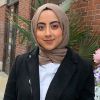
Saudah Hafeji
- Course: Medical Engineering MSc
- Year of graduation: 2020
Saudah Hafeji chose to study a Medical Engineering MSc at Leeds as the course content was really important to her. She said, “Leeds offered an exciting and wide range of modules with some really unique content, including a ‘Biomechatronics and Surgical Robotics’ module, and a ‘Tissue Engineering’ module with the Faculty of Biological Sciences.
These modules allow exploration into the latest novel research areas and I knew it would allow me to largely expand my Medical Engineering knowledge. This, coupled with the excellent reputation that the University of Leeds and the Faculty of Engineering and Physical Sciences holds, made the decision for me.”
Before deciding, Saudah also visited the Leeds campus several times and pretty much fell in love with it. She described “From the libraries, the iconic Parkinson Building, St George’s Field, and the Roger Stevens Building that people love to hate; I just really enjoyed the vibes and felt at home on campus.”
Choosing Medical Engineering
In every module, the academics were passionate and keen to share the latest research in the area within the University.
For Saudah, the best aspect of the course was the research focus. She described, “In every module, the academics were passionate and keen to share the latest research in the area within the University. This helped to contextualise the information being taught, into real-life research applications, and how it can be used to improve healthcare and people’s lives. It was also great to be able to use the cutting-edge laboratories within the School of Mechanical Engineering and the Institute of Medical and Biological Engineering (IMBE).
Overall, the University of Leeds, and the Faculty of Engineering and Physical Sciences really value innovation and research with excellent industry links, and I enjoyed this.”
Projects
As part of the ‘Team Design and Build’ module, Saudah worked with other students to develop an external fracture fixation device for use in Sierra Leone. These devices can be used to help fix fractures and must be able to support physiological load.
However, the device also had to be designed with contextual factors in mind such as budgets and costs, locally sourced materials, manufacturing techniques that can be used within the country and sustainability factored into the design throughout. She said “These wider contextual factors provided an exciting and unique challenge to the project, and really helped to develop problem-solving skills. It was also an excellent representation of the challenges associated with real-life engineering projects.”
The tibiofibular syndesmosis is a small fibrous joint, that is often injured alongside ankle sprains and can be quite difficult to repair. For the ‘Professional Project’ module, she developed experimental methodologies, using bone models and human cadaveric tissue, to investigate repair techniques that are used in syndesmosis repair. This would potentially allow improvement to current repair techniques used clinically.
Life in Leeds
Thinking back on her time in Leeds, Saudah said “Leeds is truly my favourite city! It is such a big, vibrant, and diverse place, with so much to see and do, yet small enough that it doesn’t become overwhelming. There is always something going on – and it has a really great atmosphere.
The city centre holds great places to eat and shop, with lots of activities for when you need a break from studying. And when you need somewhere quieter to relax and wind down, there are some beautiful parks to visit and independent cafés are dotted all around the city.
In my opinion, Leeds offers students a home – somewhere they can just be themselves without fear of being judged or seen as different.”
It is such a big, vibrant, and diverse place, with so much to see and do, yet small enough that it doesn’t become overwhelming.
After graduation
At present, Saudah is taking a small but much-needed break after spending the last consecutive 17 years in education. After recharging, she hopes to pursue a career in research; applying for a PhD within the Medical Engineering field, with a focus on helping to improve healthcare and patient lives.
She commented “I can confidently say my year at Leeds completing my MSc was the most valuable part of my academic journey. Throughout this year, I was provided with the opportunity to improve my research skills further, critically thinking at a deeper level, and being able to solve unique problems both independently and collaboratively. These skills will be essential in my continued research career.
With Medical Engineering being such a broad and multidisciplinary field, my experience at Leeds allowed me to really explore the specific aspects of Medical Engineering I felt passionate about, and this has guided me towards the areas of research I hope to pursue myself.”
Next generation
Thinking about words of wisdom for the new students embarking on this course, Saudah said “I would advise students to really get to know the academics and their research areas. The academics within the faculty are renowned, with excellent research and industry links, and networking will ensure you can take full advantage of these links.”
She also advised students to take all the support offered, including attending personal tutor sessions, using the Skills@Leeds library workshops, and asking for help when needed. She continued “The academics truly want to help you succeed and are always willing to meet outside scheduled hours if you are experiencing any difficulties, and this can be super helpful.
Ultimately, use the year to explore the areas of the discipline you find the most interesting, and really enjoy every moment. Among the stress and the seemingly never-ending deadlines, do take care of your mental health and wellbeing. The MSc course is challenging but it is also extremely rewarding!”
Discover more about the School of Mechanical Engineering or chat to a student.

